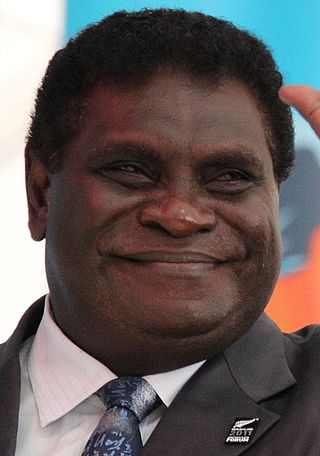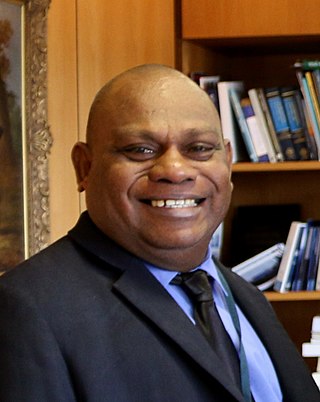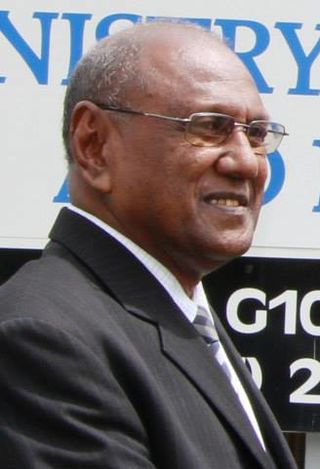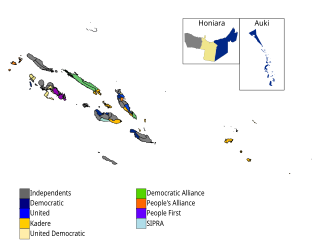Election results
| Election | Votes | % | Seats | +/– |
|---|---|---|---|---|
| 2006 | 12,030 | 6.31 (#2) | 4 / 50 | New |
| 2010 | 8,074 | 3.43 (#3) | 4 / 50 | |
| 2014 | 10,022 | 3.90 (#6) | 1 / 50 | |
| 2019 | 9,878 | 3.19 (#8) | 1 / 50 | |
| 2024 | 15,735 | 4.55 (#5) | 1 / 50 |
Solomon Islands Party for Rural Development | |
|---|---|
| Leader | Gordon Darcy Lilo |
| Founded | 2006 |
| National Parliament | 1 / 50 |
The Solomon Islands Party for Rural Advancement (SIPRA) is a political party in the Solomon Islands. It was founded in 2006 and is led by Gordon Darcy Lilo. [1] [2] The party was part of the National Coalition for Reform and Advancement, which governed the country between 2010 and 2014, with its leader Lilo being finance minister from 2010 to 2011 and then Prime Minister of Solomon Islands from 2011 to 2014. [3] The party lost all but one seat in the 2014 Solomon Islands general election with Lilo losing his seat to his nephew. [4]
| Election | Votes | % | Seats | +/– |
|---|---|---|---|---|
| 2006 | 12,030 | 6.31 (#2) | 4 / 50 | New |
| 2010 | 8,074 | 3.43 (#3) | 4 / 50 | |
| 2014 | 10,022 | 3.90 (#6) | 1 / 50 | |
| 2019 | 9,878 | 3.19 (#8) | 1 / 50 | |
| 2024 | 15,735 | 4.55 (#5) | 1 / 50 |

Danny Philip is a politician and diplomat from Solomon Islands. He was the prime minister of Solomon Islands from 2010 to 2011. Previously he served as the minister of Foreign Affairs from 1995 to 1996 and again from July 2000 to June 2001. He was the leader of the People's Progressive Party from 1997 to 2000, then founded the Reform Democratic Party, of which he was the leader when elected Prime Minister.

Gordon Darcy Lilo is a Solomon Islander politician who served as the prime minister of Solomon Islands from 16 November 2011 to 9 December 2014. He was a member of the National Parliament of the Solomon Islands, representing the Gizo/Kolombangara constituency spanning Gizo and the island of Kolombangara in Western Province. Lilo served as the Minister of Finance of the Solomon Islands from 2006 to 2007 and from 2010 to 2011.

Clay Forau Soalaoi, more commonly referred to as Clay Forau, is a Solomon Islands politician.

Stanley Festus Sofu is a Solomon Islands politician.

General elections were held in the Solomon Islands on 4 August 2010. The election date was announced in May 2010 by Prime Minister Derek Sikua. Although the announcement was deemed to be premature, as only the Governor General has the authority to announce the election date upon the advice of the Electoral Commission, the election date remained the same.
Joseph Onika is a Solomon Islands politician.
Commins Aston Mewa is a Solomon Islands politician.
Hypolite Taremae is a Solomon Islands politician.
John Moffat Fugui was a Solomon Islands politician and political adviser. He served as Minister for the Environment, Climate Change, Disaster Management and Meteorology in Prime Minister Danny Philip's Cabinet. He was also in his later years the first Solomon Islands Ambassador to China and died as it in December 2022.
Elijah Doro Muala was a Solomon Islands politician.

Peter Shannel Agovaka is a Solomon Islands politician.

The 9th Parliament of Solomon Islands, determined by the 2010 general election, was the National Parliament of Solomon Islands from 2010 until 2014. It was preceded by the eighth and followed by the tenth.
Alfred Ghiro is a Solomon Islands politician.

George Milner Tozaka OBE, better known as Milner Tozaka, is a Solomon Islands diplomat and politician.

Rick Houenipwela, more commonly known as Rick Hou, is a Solomon Islander politician who served as the prime minister of Solomon Islands from 15 November 2017 to 24 April 2019.
Vika Koto Lusibaea is a Solomon Islands politician.

General elections were held in the Solomon Islands on 19 November 2014. Independent candidates won 32 of the 50 seats in the National Parliament, with the Democratic Alliance Party emerging as the largest party with seven seats.

General elections were held in Solomon Islands on 3 April 2019 to determine the composition of the 11th Parliament. The election was the first to occur since the conclusion of the Regional Assistance Mission to the Solomon Islands (RAMSI) in 2017. Parliament passed amendments to the electoral act in 2018 that included the introduction of pre-polling, a significant increase in campaign budgets for candidates and stricter penalties for individuals committing electoral offences such as vote-buying. Ten of the thirteen parties that contested the election won seats, and the Solomon Islands Democratic Party and the Kadere Party were the parties that secured the highest amount, winning eight each. However, as in previous elections, independent candidates won the largest share of seats, securing 21.

The Ministry of Finance and Treasury is a government ministry of the Solomon Islands responsible for public finances. The ministry is located in Honiara.
Lanelle Olandrea Tanangada is a Solomon Islands teacher and politician who has served as the country's Education Minister since April 2020.
{{cite web}}: |first= has generic name (help)